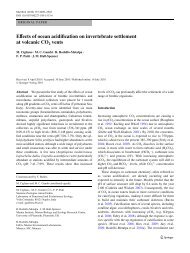South Africa's White Shark cage-diving industry - Save Our Seas ...
South Africa's White Shark cage-diving industry - Save Our Seas ...
South Africa's White Shark cage-diving industry - Save Our Seas ...
You also want an ePaper? Increase the reach of your titles
YUMPU automatically turns print PDFs into web optimized ePapers that Google loves.
Table 4. Management recommendations<br />
<strong>South</strong> Africa’s <strong>White</strong> <strong>Shark</strong> <strong>cage</strong>-<strong>diving</strong> <strong>industry</strong> -<br />
is their cause for concern?<br />
� Introduce 'compliance information sheet' that must be displayed by operators on vessels and<br />
advertisements (e.g. websites, brochures)<br />
� Create easy and effective channels for tourists to lodge complaints against operators in regard to<br />
such a 'compliance sheet'.<br />
� Prioritize the issuing of operational permits to the <strong>industry</strong>.<br />
� Re-investigate the effectiveness of '<strong>industry</strong> self-regulation' (e.g. the white shark protection<br />
foundation) as a means of ensuring compliance.<br />
� Initiate an ongoing observer program throughout the <strong>industry</strong>.<br />
� Readdress "unenforceable" stipulations in current code of conduct and permit conditions.<br />
7. The way forward<br />
In summary, it is apparent that <strong>cage</strong>-<strong>diving</strong> management must be dynamic and respond to<br />
continual developments in research and understanding. Whilst the authors are confident that<br />
<strong>cage</strong> <strong>diving</strong> activities are not contributing to the recent rise in attack rate, we recognize that<br />
even a perceived link may have dramatic consequences on the white sharks national<br />
conservation status, and the stability of an economically viable non-consumptive <strong>industry</strong>.<br />
Recent research that has focused on addressing some of these voiced concerns has been<br />
presented here, with the intention of informing those concerned on the scientific justification<br />
behind management decisions.<br />
Cage <strong>diving</strong> is a non-consumptive utilisation of white sharks, which despite protection are<br />
vulnerable to consumptive exploitation from humans. These operations are consistent with<br />
the MLR's act stipulation for optimal and sustainable resource utilisation. To minimize<br />
ecological and behavioural impacts 'Permit Conditions' and a 'Code of Conduct' have been<br />
established. If followed, <strong>cage</strong> <strong>diving</strong> can be a beneficial <strong>industry</strong> that in no way augments the<br />
small risks that white sharks represent to humans. At present, however, the disregard of<br />
permit conditions, by some operators, has understandably established a negative public<br />
perception towards the <strong>industry</strong>. This perception has been exacerbated by the recent spate<br />
of attacks in the False Bay region. DEAT's recent action against offending operators has<br />
successfully halted extreme cases of non-compliance (e.g. chumming off swimming<br />
beaches). However, such enforcement must be extended to include the numerous 'less<br />
dramatic' breaches of operational protocol that occur on an almost daily basis (i.e. intentional<br />
feeding of sharks). It must be appreciated that dissatisfaction over DEAT's failure to timely<br />
issue permits has, in part, led to the disrespecting of regulations as recognized by Maharaj et<br />
al. (2003). Ultimately the issuing of permits, and increased compliance enforcement will<br />
benefit the <strong>industry</strong>, the white sharks conservation status, and most importantly satisfy the<br />
Pg 57<br />
ANNEXURE 1






